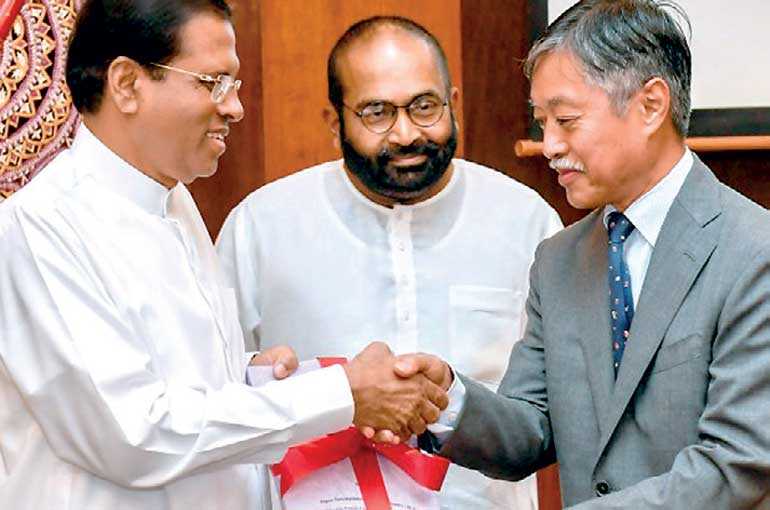Wednesday Feb 18, 2026
Wednesday Feb 18, 2026
Thursday, 12 July 2018 00:21 - - {{hitsCtrl.values.hits}}

On 10 July, a presentation on the final report of ‘The Project on Electricity Sector Master Plan Study’ was held at the National Economic Council (NEC) chaired by President Maithripala Sirisena. The key Ministers in the cabinet, including the Minister of Finance and Mass Media, the Minister of Power and Renewable Energy and the secretaries of those Ministries were also present at the Council meeting.
The presentation was made by Noboru Seki – the Team Leader of the Master Plan Study team. Ambassador for Japan Kenichi Suganuma and Chief Representative of JICA Sri Lanka Fusato Tanaka were also in attendance at the meeting held at the President’s Office in Colombo.
Ceylon Electricity Board (CEB), which is responsible for developing, operating and maintaining a stable, efficient and economical electricity supply system, prepares mid to long term investment plans. These plans, which identify future investment projects, such as power generations, transmission lines, substations and distribution network to meet the future demand projections, are formulated based on the Master Plan, which covers 25 years and includes elaborated electricity demand modelling and power system analysis. Any master plan needs to be reviewed and updated at least once in every 10 years to meet such requirements. With this Master Plan completed in March 2018, the latest master plan, which was also formulated through the support of JICA in 2006, has been updated by considering development in the country and the latest technologies available in the field of power systems for the next 25 years.
The JICA-supported Master Plan has developed a comprehensive master plan of 25 years for the generation, transmission and distribution development of power for the whole country. The Master Plan covers the consideration of new technical challenges which CEB as an implementing organisation may face by 2040, such as expansion of non-conventional renewable energy sources, private sector participation, optimal operation of thermal power plants and utilisation of local gas and LNG.
The long term power development plan was examined in terms of three factors: cost, environment and energy security. The JICA-supported Master Plan recommends the best mix scenario, which includes various power sources in a balanced way. Similar scenarios have been endorsed in the recently-approved energy policy by the Cabinet and the latest Least Cost Long Term Generation Expansion Plan (LCLTGEP) of Ceylon Electricity Board.
JICA has been cooperating in the power sector of Sri Lanka for a long time, through not only technical cooperation but also ODA loans. It is expected to achieve stable, economical and environmentally friendly electricity supply in Sri Lanka.
Japan International Cooperation Agency (JICA) is the executing agency of Japan’s Bilateral Official Development Assistance (ODA). JICA, the world biggest bilateral aid agency, works in over 150 countries and regions. In accordance with its vision of “Inclusive and Dynamic Development,” JICA supports the resolution of development issues in developing countries. In Sri Lanka, Japan has been providing financial and technical assistance since 1954 and is one of the largest donors to the country. On behalf of the people and the Government of Japan, JICA contributes to improve the lives of people in Sri Lanka.